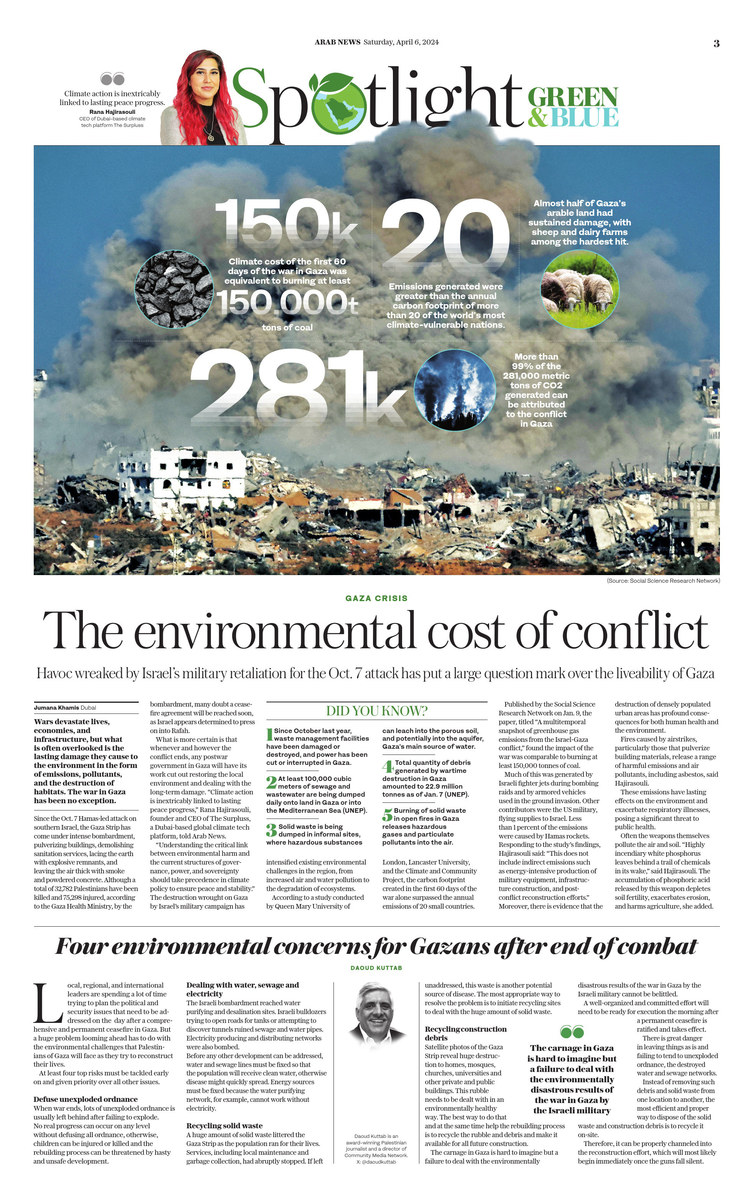Four environmental concerns for Gazans after the end of combat

https://arab.news/vmu75
Local, regional, and international leaders are spending a lot of time trying to plan the political and security issues that need to be addressed on the day after a comprehensive and permanent ceasefire in Gaza. But a huge problem looming ahead has to do with the environmental challenges that Palestinians of Gaza will face as they try to reconstruct their lives.
At least four top risks must be tackled early on and given priority over all other issues.
Defuse unexploded ordnance.
When war ends, lots of unexploded ordnance is usually left behind after failing to explode. No real progress can occur on any level without defusing all ordnance, otherwise, children can be injured or killed and the rebuilding process can be threatened by hasty and unsafe development.
Dealing with water, sewage and electricity.
The Israeli bombardment reached water purifying and desalination sites. Israeli bulldozers trying to open roads for tanks or attempting to discover tunnels ruined sewage and water pipes. Electricity producing and distributing networks were also bombed. Before any other development can be addressed, water and sewage lines must be fixed so that the population will receive clean water, otherwise disease might quickly spread. Energy sources must be fixed because the water purifying network, for example, cannot work without electricity.
Recycling solid waste.
A huge amount of solid waste littered the Gaza Strip as the population ran for their lives. Services, including local maintenance and garbage collection, had abruptly stopped. If left unaddressed, this waste is another potential source of disease. The most appropriate way to resolve the problem is to initiate recycling sites to deal with the huge amount of solid waste.
Recycling construction debris.
Satellite photos of the Gaza Strip reveal huge destruction to homes, mosques, churches, universities and other private and public buildings. This rubble needs to be dealt with in an environmentally healthy way. The best way to do that and at the same time help the rebuilding process is to recycle the rubble and debris and make it available for all future construction.
A failure to deal with the environmentally disastrous results of the war in Gaza by the Israeli military cannot be belittled
Daoud Kuttab
The carnage in Gaza is hard to imagine but a failure to deal with the environmentally disastrous results of the war in Gaza by the Israeli military cannot be belittled.
A well organized and committed effort will need to be ready for execution the morning after a permanent ceasefire is ratified and takes effect.
There is great danger in leaving things as is and failing to tend to unexploded ordnance, the destroyed water and sewage networks, and the exceedingly large amount of solid waste.
Instead of removing such debris and solid waste from one location to another, the most efficient and proper way to dispose of the solid waste and construction debris is to recycle it on-site.
Therefore, it can be properly channeled into the reconstruction effort, which will most likely begin immediately once the guns fall silent.
• Daoud Kuttab is an award-winning Palestinian journalist and a director of Community Media Network. X: @daoudkuttab



























